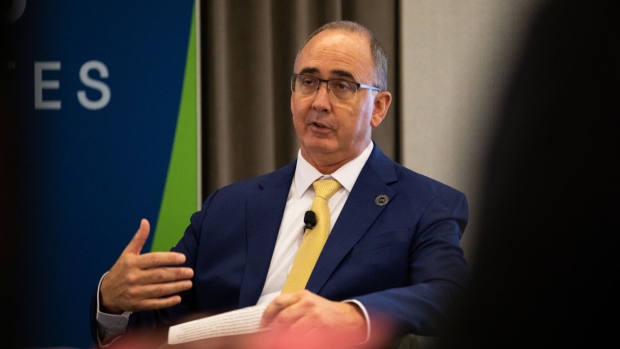Aug 18, 2023
United Auto Workers President Warns Biden That Trump’s EV Attacks Touch a Nerve
, Bloomberg News

(Bloomberg) -- President Joe Biden and Democrats need to do more to support the United Auto Workers’ fight for higher wages at battery plants — or they’ll be vulnerable to claims that electric vehicles are destroying good-paying auto jobs, the union’s top leader said.
Former President Donald Trump, the 2024 Republican frontrunner, has attacked Biden’s EV agenda, warning the transition to electric cars will “decimate” auto jobs. UAW President Shawn Fain, who’s been fighting the idling of a Stellantis NV assembly plant in Illinois and other plants in Michigan, said Trump is touching a nerve.
“I have cautioned everybody in Washington DC that they better understand one thing – our workers’ experience right now with this EV transition is not a good thing,” Fain said in an interview at the UAW’s Detroit headquarters Thursday. “So when somebody else comes along and says, ‘Get ready to watch your jobs disappear,’ that is gonna resonate.”
The UAW is locked in contentious contract negotiations with the so-called “Big Three” auto manufacturers: General Motors Co., Ford Motor Co. and Stellantis, maker of Jeep and Chrysler models. Fain met with Biden and senior White House staff last month to brief them on negotiations.
A crucial issue is whether the thousands of workers needed to staff battery plants springing up across the country will earn wages on par with members at vehicle assembly plants. Employees at Ultium Cells LLC, GM’s venture with LG Energy Solution in Ohio, start at $15.50 an hour, half the top wage at assembly plants.
Read more: Detroit Carmakers Resist Pressure to Pay Up for Battery Workers
Fain, who became the UAW’s first directly-elected president this year, is determined to win back benefits given up during the financial crisis to help save car companies. He’s also hinted at striking all three carmakers if no agreement is reached by Sept. 14, when the current contract expires.
Stellantis declined to comment. Ford didn’t immediately respond to a request for comment.
GM pointed to an earlier statement. “We will continue to bargain in good faith with the UAW to maintain our momentum and to provide opportunities for all in our EV future,” GM said.
The negotiations and broader EV transition present a political challenge for Biden, who’s touted himself as the most pro-union president ever, but has found his aspiration for a clean-energy economy in tension with his friendliness to organized labor.
He waded into the labor conflict this week, calling on the Detroit Three to “take every possible step to avoid painful plant closings.”
The administration has found ways to work wage and labor requirements into its industrial policy push. Those include updating 40-year-old wage standards to ensure contractors on federally-funded construction projects are paid the local rate. But other efforts, like an additional tax credit for union-made electric vehicles that Biden proposed as part of his signature climate law, have fallen flat.
An added challenge is that many of the electric-vehicle and battery investments spurred by the Inflation Reduction Act are cropping up in southern, right-to-work states that aren’t especially friendly to organized labor. Biden’s Department of Energy infuriated the UAW earlier this summer by awarding a $9.2 billion loan to Ford and its South Korean battery partner SK On for three battery plants in Tennessee and Kentucky.
Earlier: Union Blasts $9.2 Billion Loan to Ford Over ‘Low-Road Jobs’
Senior Biden adviser Gene Sperling said the president is “strongly committed to a just transition, where every worker has the full and unobstructed opportunity to be part of a union and where existing and new auto jobs remain good, well-paying jobs that can support a family.”
“Since the first day of his administration the President’s goals have remained the same: to have a transition to Electric Vehicles that not only creates more American jobs but more good union jobs,” he added.
The White House’s power is limited: US law restricts the government from directly favoring unionized firms, but gives it leeway, when spending taxpayer money, to establish minimum wage or benefit standards, and to give preference to companies that have reached labor peace deals which reduce the likelihood of strikes.
“It’s not like Biden can just sign something and insist that a new battery plant that’s being built in Indiana is going to be unionized,” said University of North Carolina labor law professor Jeffrey Hirsch, a former US National Labor Relations Board attorney.
“There are more subtle things they can do,” to boost organizing efforts, Hirsch said, both by establishing labor-friendly rules and by using the presidential bully pulpit.
Fain called Biden’s statement this week “a good start,” but said there’s “more work to be done,” without going into specifics.
“When a corporation wants money and they come to the government with their hand out, they always find a way to make it happen,” he said. “When labor goes to the government and says, ‘We need help,’ there’s always a reason why we can’t do it.”
Major labor groups including the AFL-CIO and SEIU have endorsed Biden’s reelection, but the UAW, which endorsed him in 2020, has yet to back a candidate for 2024.
“If you expect to get our endorsement just because you show up one day with your hand out and you got a D in front of your name, that’s not gonna happen,” Fain said. “You’ll get our endorsement through your actions.”
Fain has previously said another Trump presidency would be a “disaster” and discounted the possibility of endorsing him.
--With assistance from Jordan Fabian, Justin Sink, Keith Naughton, Josh Eidelson, Mackenzie Hawkins and David Welch.
(Updates Sperling comments in 13th and 14th paragraphs.)
©2023 Bloomberg L.P.








